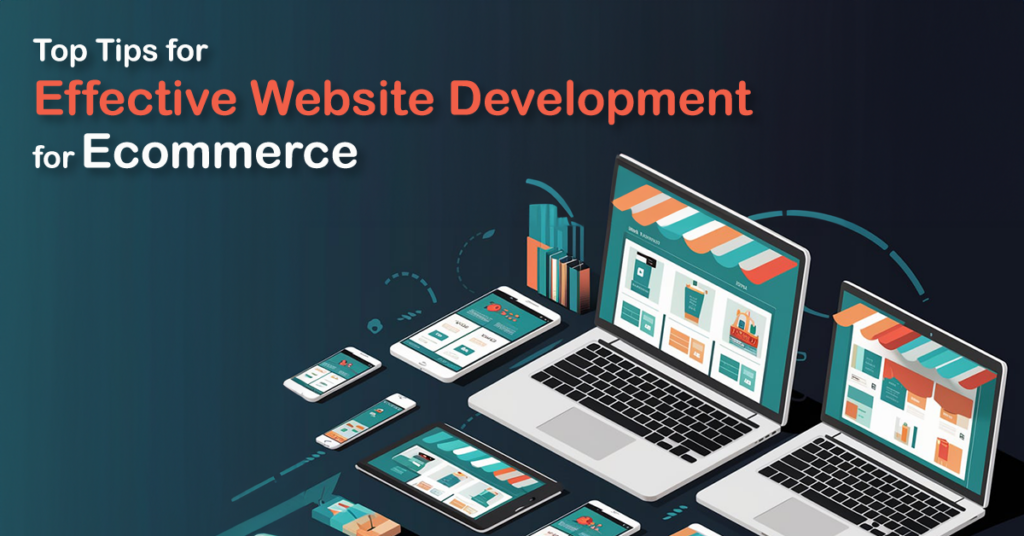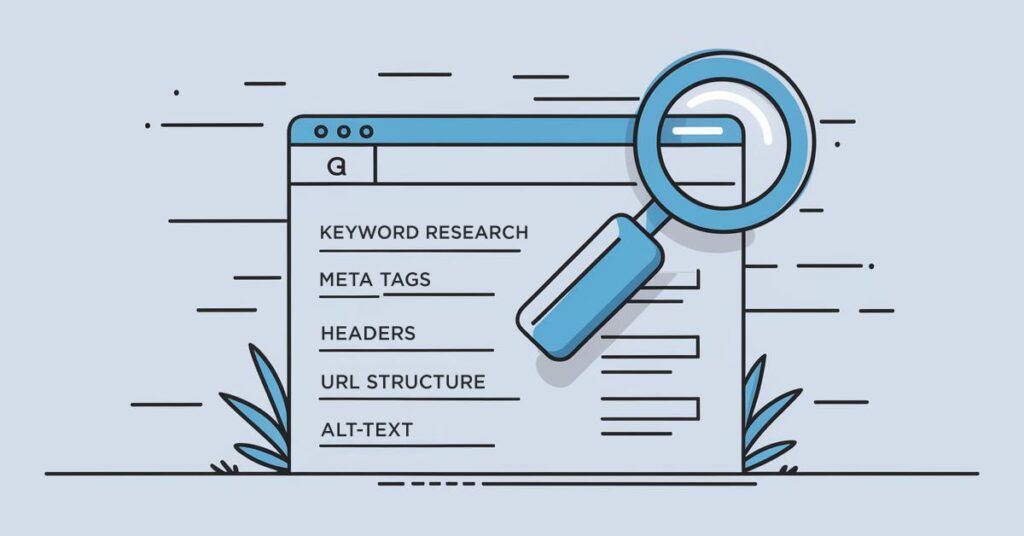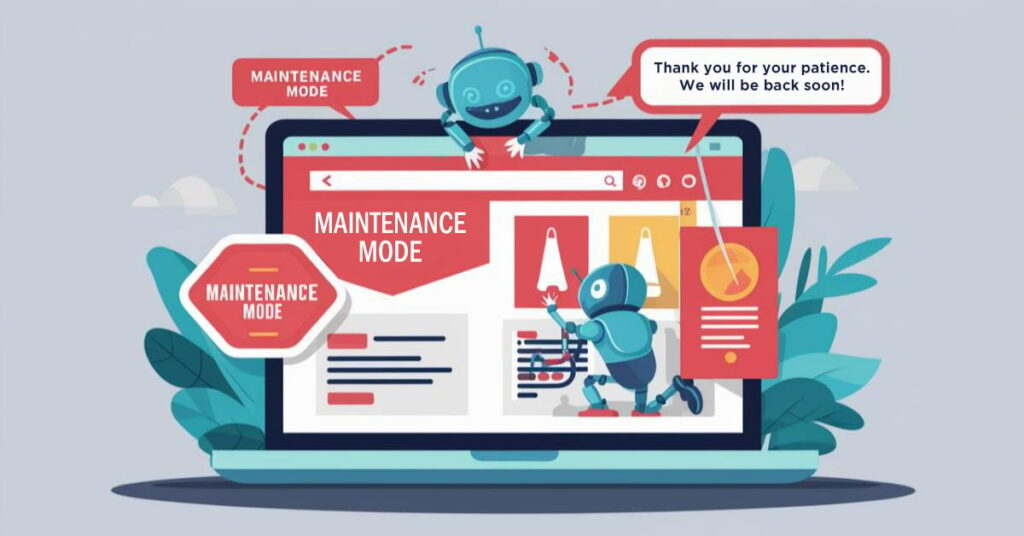
Looking to build a successful ecommerce website? This article covers key aspects of ecommerce website development services, from platform selection to user experience optimization. Get the insights you need to create a site that drives sales.
Ecommerce website development enhances business control, reduces costs, and enables effective budget allocation while improving user experience and functionality.
Key elements for a successful ecommerce site include a user-friendly interface, multiple payment gateways, high-quality product images, and streamlined checkout processes.
Choosing the right ecommerce platform and developer is crucial, requiring careful evaluation of business needs, scalability, and ongoing support for long-term success.
Introduction to Ecommerce Website Development

Ecommerce website development is the process of creating an online store that allows businesses to sell their products or services over the internet. With the rise of ecommerce, businesses are shifting their focus from traditional brick-and-mortar stores to online stores, making it essential to have a professional and user-friendly ecommerce website. A custom ecommerce website development company can help businesses create a unique online store that meets their specific needs and requirements.
In today’s digital age, having an online presence is no longer optional but a necessity. Custom ecommerce websites offer businesses the opportunity to reach a global audience, operate 24/7, and provide a seamless shopping experience. By leveraging custom ecommerce development services, businesses can ensure their online store stands out in a crowded market, offering unique features and functionalities tailored to their specific business model.
Understanding Website Development for Ecommerce

The primary purpose of ecommerce website development is to leverage the advantages of online shopping to generate revenue. For businesses, particularly small ones, having an ecommerce website provides greater control over operations and reduces reliance on third-party platforms, which often come with their own set of limitations and fees.
Eliminating costs associated with maintaining a physical presence allows businesses to allocate their budgets more effectively, focusing on areas that directly contribute to growth.
Investing in custom ecommerce software can be significant, but it offers tailored solutions that meet specific business needs, ultimately providing a competitive edge. A well-developed ecommerce site is more than just an online store; it’s a powerful tool for generating leads, increasing traffic, and boosting sales and revenue. The development process starts with identifying the specific needs of the website, understanding the target audience, and designing a user-friendly interface. Clarifying business goals and the target audience is essential before selecting an ecommerce platform or hiring a web developer.
Before launching, thoroughly test all functions of the site, especially the purchase process. This includes checking loading speed, mobile responsiveness, and checkout efficiency. Seamless functionality can significantly enhance user experience and minimize abandoned carts.
Key Elements of a Successful Ecommerce Website
A successful ecommerce website hinges on several key elements that collectively enhance the user experience and drive conversions. A user-friendly interface that allows customers to easily navigate the site and find products is crucial. Intuitive design features such as clear calls to action and a clean, uncluttered layout significantly retain visitors and encourage purchases, making effective ecommerce web design essential.
Custom ecommerce development building is significant for businesses aiming to enhance their online presence, as it allows for tailored solutions that meet specific business needs and overcome potential challenges.
Additionally, integrating multiple payment gateways provides customers with secure and convenient options, which can enhance their trust in the site and improve the overall shopping experience. Streamlining the checkout process with minimal steps and clear progress indicators can also significantly boost conversion rates.
Displaying high-quality product images and customer ratings further enhances product discovery and customer confidence, making it easier for shoppers to make informed decisions.
Choosing the Right Ecommerce Platform

Choosing the right ecommerce platform can significantly influence the success of your online store and online stores. Each platform has its own set of advantages and disadvantages, so evaluate them based on your specific business requirements.
It is also crucial to select the right e-commerce app development services to ensure your platform is tailored to meet your business needs and technical requirements.
Shopify, for instance, is ideal for newcomers due to its easy setup and management. However, its subscription model can become costly as your business grows.
Magento, on the other hand, is well-suited for larger businesses that need a scalable solution capable of handling high traffic volumes. Its flexibility and advanced SEO customization options are beneficial for businesses aiming for high online visibility. However, Magento’s steep learning curve means it is better suited for users with technical expertise.
WooCommerce offers extensive customization options and integrates seamlessly with WordPress, making it an excellent choice for businesses already using this content management system. Nonetheless, it requires technical knowledge for setup and ongoing management.
Consider factors such as ease of use, scalability, cost, and technical requirements to choose the platform that best aligns with your business goals and capabilities.
Custom Ecommerce Solutions

Custom ecommerce solutions, through custom development, offer advantages that can significantly enhance your online business. Designed with flexibility in mind, these platforms allow businesses to scale operations and adapt to market changes easily.
Custom solutions provide unique functionalities not available in standard platforms, enhancing the shopping experience and differentiating your brand.
Incorporating specific business requirements into the development process, custom ecommerce solutions can increase conversion rates, enhance security, and create a unique brand identity for your ecommerce business. This tailored approach ensures that your ecommerce site is functional and aligned with your business goals and customer expectations.
Benefits of Custom Ecommerce Websites
Custom ecommerce websites offer several benefits to businesses, including increased flexibility, control, and scalability. With a custom ecommerce website, businesses can create a unique brand identity, tailor their website to their specific needs, and integrate third-party APIs to add new functionality. Custom ecommerce websites also provide more options on the frontend and backend, allowing businesses to make changes and updates as needed.
Additionally, custom ecommerce websites can be more cost-effective in the long run, as businesses do not have to pay licensing fees or rely on third-party vendors. By opting for custom ecommerce website development, businesses can ensure their site is optimized for their target audience, providing a personalized shopping experience that can drive higher conversion rates.
Custom ecommerce solutions also offer enhanced security features, protecting sensitive customer data and building trust. Furthermore, the ability to scale and adapt to market changes ensures that the ecommerce website can grow alongside the business, accommodating increased traffic and expanding product lines without compromising performance.
Responsive Design for Mobile Commerce

In today’s mobile-first world, ensuring your ecommerce website is mobile-responsive is crucial for delivering a consistent shopping experience across all devices. Frameworks like Bootstrap or custom coding can help create responsive designs that cater specifically to ecommerce sites.
Mobile apps are also essential in providing a seamless user experience, matching the functionality and quality of desktop versions while ensuring an intuitive interface and easy navigation on mobile devices.
A well-designed mobile site should provide easy navigation, maintain functionality, and load quickly to enhance user satisfaction.
Regular testing across different devices ensures that your responsive design is effective and that all features function correctly. This ongoing process helps identify and resolve issues, ensuring that your mobile site continues to meet customer needs.
SEO Strategies for Ecommerce Websites

SEO is crucial for ecommerce web development, helping businesses compete in search results and attract interested users. Effective SEO practices enhance the visibility and ranking of ecommerce websites, making products more discoverable. Technical SEO elements such as performance optimization, mobile-friendliness, and incremental loading can significantly impact site speed and indexing by search engines.
Creating SEO-friendly content for product descriptions and website pages improves search engine rankings. Incorporating relevant keywords and optimizing meta tags can enhance visibility in search results, driving more traffic and ultimately boosting sales.
Integrating Payment Gateways

Integrating payment gateways is crucial in ecommerce web development, directly impacting the checkout experience and conversion rates. There are two main types: integrated and hosted. Hosted payment gateways redirect users to a separate platform for payment processing, simplifying integration. Integrated payment gateways allow direct payments on the website, enhancing transaction speed.
Integrating a payment gateway requires creating a merchant account and acquiring API keys from the payment service provider. Payment gateways serve as digital intermediaries that securely process electronic transactions, preventing sensitive data from being stored on the ecommerce site. This improves online sales conversion rates and ensures a secure, efficient checkout experience.
Enhancing User Experience (UX)

User experience (UX) is fundamental in ecommerce website development, helping customers find information and convert into paying customers. Custom ecommerce solutions provide tailored experiences and interfaces that align with brand identity and audience needs, leading to improved customer engagement. Responsive design enhances UX, increasing customer engagement and sales.
Ecommerce websites should prioritize mobile usability, given that many customers now shop via smartphones. Intuitive navigation helps users find what they need quickly, improving their overall experience. Fast loading times are crucial as they significantly enhance user satisfaction and reduce site abandonment. Additionally, a well-designed mobile app can further enhance user experience by offering customizable solutions and seamless integration with various technologies.
Enhancing website speed and performance is crucial for user satisfaction and SEO. Regular testing and adjustments based on user feedback maintain a high-quality user experience.
Security Measures for Ecommerce Websites

Security measures and compliance with data protection regulations are vital in ecommerce development. Protecting sensitive customer financial information is crucial. Implementing SSL encryption safeguards data during online transactions. PCI security standards outline key goals to protect cardholder data, ensuring customer information is secure. Meeting PCI compliance can enhance customer trust and potentially lead to increased business.
Regular maintenance safeguards customer data against cyber threats. Enhanced security measures, including robust encryption and compliance with payment standards, are prioritized in custom ecommerce development. Compliance with data privacy regulations, like GDPR, is also essential when setting up analytics on ecommerce sites.
Effective Product Management

Effective product management in ecommerce involves adapting traditional principles to the online market, focusing on the product lifecycle from creation to sale. Ecommerce product managers analyze consumer behavior and market trends to inform product decisions and enhance offerings.
Agile methodology helps teams quickly adapt to seasonal changes in demand and optimize inventory management. Real-time data processing allows immediate adjustments in inventory management and pricing strategies.
Creating product bundles can enhance average order values and help move older stock while attracting customers. Personalizing marketing based on customer behavior can effectively increase sales and build stronger connections.
Utilizing metrics from sales analytics and customer feedback, product managers can identify areas for improvement and customer satisfaction.
Marketing Strategies for Ecommerce Success

Implementing digital marketing strategies is crucial for the long-term success of ecommerce businesses. Developing an ecommerce marketing strategy early helps define the site structure and necessary features. Partnering with a digital marketing agency can assist in developing, implementing, and tracking successful marketing campaigns. Integrating social media into your marketing strategy can be enhanced by including social sharing options.
The rapid growth and significance of online businesses in global retail sales cannot be overstated. The rise of ecommerce platforms has simplified the process for various online businesses to establish a strong online presence, catering to diverse market needs through customizable solutions.
Effective data analytics help understand which marketing channels yield the most sales. Advanced analytics techniques, such as customer segmentation, improve tailored marketing strategies. Incorporating emerging technologies like AR, VR, and voice search enhances customer engagement and helps differentiate your ecommerce brand.
Focusing on customer lifetime value (CLV) encourages repeat business through loyalty programs, which are vital for growth.
Analytics and Performance Tracking

Robust analytics tools, like Google Analytics, provide detailed insights into customer behavior and sales performance for informed decision-making. Collected data can help optimize marketing strategies, improve product offerings, and personalize the customer experience.
Custom solutions facilitate seamless integration with third-party services, optimizing operational efficiency.
Ecommerce Website Development Challenges
Ecommerce website development can be challenging, especially for businesses that are new to online sales. Some common challenges include creating a user-friendly interface, ensuring website security, and integrating payment gateways. Additionally, businesses may struggle with search engine optimization (SEO) and content management, which are essential for driving traffic and sales to the website.
Furthermore, ecommerce website development requires ongoing maintenance and optimization to ensure that the website remains secure, up-to-date, and competitive. Navigating these challenges requires a strategic approach and a deep understanding of both the technical and business aspects of ecommerce.
Ensuring a seamless user experience, protecting customer data, and maintaining high search engine rankings are critical components that can make or break an online store. Businesses must also stay abreast of the latest trends and technologies to keep their ecommerce websites relevant and engaging.
Overcoming Ecommerce Website Development Challenges
To overcome ecommerce website development challenges, businesses can work with a custom ecommerce development company that has experience in creating online stores. These companies can help businesses create a user-friendly interface, ensure website security, and integrate payment gateways.
Additionally, they can provide guidance on SEO and content management, and offer ongoing maintenance and optimization services to ensure that the website remains competitive. By working with a custom ecommerce development company, businesses can create a successful online store that meets their specific needs and requirements.
Partnering with experts in custom ecommerce development allows businesses to leverage specialized knowledge and tools, ensuring that their ecommerce website is built to the highest standards. These professionals can implement best practices for user experience design, security protocols, and SEO strategies, helping businesses achieve their goals and drive sales.
Ongoing support and maintenance from a custom ecommerce development company ensure that the website continues to perform optimally, adapting to new challenges and opportunities as they arise.
Top Tools for Ecommerce Website Development
There are several top tools for ecommerce website development, including Shopify, Magento, BigCommerce, and WooCommerce. These tools offer a range of features and functionality, including customizable templates, payment gateways, and SEO optimization.
Additionally, they provide ongoing maintenance and optimization services to ensure that the website remains secure, up-to-date, and competitive. When choosing an ecommerce website development tool, businesses should consider their specific needs and requirements, as well as their budget and technical expertise.
Shopify is known for its ease of use and extensive app ecosystem, making it a popular choice for small to medium-sized businesses. Magento offers robust customization options and scalability, ideal for larger enterprises with complex needs. BigCommerce provides a balance of flexibility and user-friendliness, catering to businesses of all sizes.
WooCommerce, a plugin for WordPress, offers deep integration with the content management system, providing extensive customization options for those familiar with the platform. Each tool has its strengths, and selecting the right one depends on the specific goals and resources of the business.
Ongoing Maintenance and Updates

Continuous maintenance and support keep custom ecommerce platforms secure and relevant. Regular monitoring and updates maintain PCI compliance and secure customer data. Ongoing maintenance allows websites to adapt to evolving customer expectations and industry trends.
Routine maintenance ensures compatibility across various web browsers and devices. Identifying and fixing bugs is necessary to maintain a smooth user experience. Regular backups provide a safety net for quick recovery in case of data loss.
How to Choose an Ecommerce Website Developer

Choosing the right ecommerce website developer is crucial for the success of your online store. Select a development company with proven success in ecommerce website development. A reliable developer should be flexible and adapt to your specific requirements.
Look for developers who maintain up-to-date knowledge of the latest technologies and trends. Their process should be predictable and streamlined to ensure success. Affordable and transparent pricing structures are essential when selecting a developer.
The chosen developer should provide ongoing support and maintenance for the ecommerce site.
Summary
Ecommerce website development is a multifaceted process that requires careful planning and execution. By understanding the key elements of a successful ecommerce site, choosing the right platform, and implementing robust security measures, businesses can create a powerful online presence. Custom ecommerce solutions and responsive design further enhance user experience, while effective SEO strategies, payment gateway integration, and product management drive traffic and sales.
In conclusion, continuous maintenance and analytics tracking are essential for long-term success. By partnering with a reliable ecommerce website developer, businesses can ensure their site remains secure, relevant, and capable of meeting evolving customer expectations. Start your ecommerce journey today and transform your online business into a thriving enterprise.
Frequently Asked Questions
Why is mobile responsiveness important for ecommerce websites?
Mobile responsiveness is vital for ecommerce websites because it provides a seamless shopping experience on all devices, meeting the expectations of smartphone users. This leads to improved customer satisfaction and potentially higher sales.
What are the benefits of using custom ecommerce solutions?
Using custom ecommerce solutions significantly boosts conversion rates and enhances security, while also providing a unique brand identity and unmatched functionality. These solutions allow for flexibility and scalability, enabling businesses to adapt effectively to market changes.
How do payment gateways improve the checkout experience?
Payment gateways enhance the checkout experience by securely processing transactions and preventing the storage of sensitive data on e-commerce sites, which boosts both efficiency and customer trust. This results in a smoother, more secure purchasing process for users.
What role does SEO play in ecommerce website development?
SEO is essential for ecommerce website development as it improves visibility and drives targeted traffic, helping businesses stand out in competitive search results. By implementing effective SEO practices, your products become more discoverable to interested customers.
What should I consider when choosing an ecommerce website developer?
When selecting an ecommerce website developer, prioritize their track record in ecommerce success, familiarity with current technologies, clear processes, transparent pricing, and commitment to ongoing support. These factors will ensure a robust and reliable online presence for your business.





